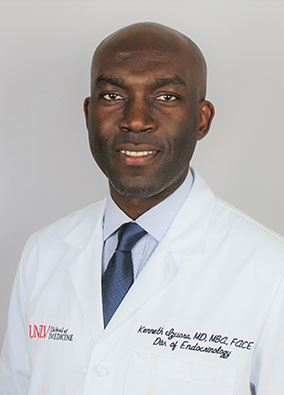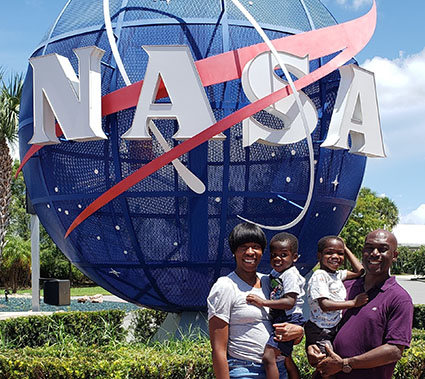From Nigeria With Love: UNLV Medicine Physician Kenneth Izuora
January 4, 2021 by agutting@reviewjournal.com
Filed under Conversation, Health
From Nigeria With Love: UNLV Medicine Physician Kenneth Izuora
BY PAUL HARASIM
Dr. Kenneth Izuora, who heads the UNLV School of Medicine Division of Endocrinology, grew up in Nigeria — nearly 8,000 miles from Las Vegas. When he flies to see members of his family, it takes nearly 16 hours in the air.
To many Americans, particularly those who pay attention to the critical role fossil fuels play in the global economy, Nigeria — where Izuora spent his early years and graduated from medical school — means oil. The former British colony is Africa’s largest oil producer, generally a top 10 oil producer worldwide. To those who follow the demographics of the huge African continent, Nigeria is Africa’s most populous nation. One in five Africans is Nigerian.
An associate professor in the medical school’s department of internal medicine as well as a member of the UNLV Medicine COVID-19 Task Force, Izuora still speaks with wonder about the endocrine system, which involves an intricate network of glands producing hormones that regulate a number of functions in the body — including respiration, metabolism, reproduction, sensory perception, movement, sexual development and growth.
“In disease,” he points out, “when the hormones are too high or too little, those functions they regulate become abnormal. Diabetes, for example, is from too little effective insulin and hyperthyroidism — which can cause unintentional weight loss and a rapid or irregular heartbeat — is from too much thyroid hormone.”
Izuora remembers that the power of a microscope first turned him on to science as a little boy in his hometown of Ogid, Nigeria.
“My dad was a biology teacher, so I got to use his microscope. What I saw was so amazing,” says Izuora, who became an American citizen in the last decade. Under the microscope, an organism he may have seen with his naked eye that seemed smooth was actually covered in scratches — or something he thought was round actually had straight edges and angles.
“I fell in love with a whole new world,” says Izuora, whose mother was an elementary school principal. “I feel I have always loved science…I enjoy understanding how things work.”
At one point during high school, he thought his love for science would manifest itself in a career in engineering. But the human dimension of medicine won out. “I came to think of medicine as a sort of engineering of the human body to keep it running healthy for as long as possible.”
After medical school in Nigeria, he completed an internal medicine residency in New York at the University of Rochester/Unity Health System and a fellowship in endocrinology and metabolism at Georgia’s Emory University. He also had previously done research and received an MBA in health administration at the University of Colorado.
“Beyond medical school, my first exposure to endocrinology was while conducting diabetes-related research at the University of Colorado,” says Izuora, who is married and the father of two young boys. “I was amazed by the effect of receiving the right treatment on alleviating the anxiety and improving the health of patients with endocrine disorders.”
The technology he was able to use during his post-graduate training went a long way toward convincing him to stay in the U.S. “The technology allows you to make a difference with more people,” says Izuora, whose considerable research on the endocrine system has appeared in peer-reviewed publications that include the Journal of Investigative Medicine.
About half of Izuora’s patients today have diabetes — Type 1, an autoimmune disease, and Type 2, a metabolic disorder. Both can lead to chronically high blood sugar levels, increasing the risk of diabetic complications, which include cardiovascular disease, nerve and kidney damage, and now an increased risk of COVID-19 complications.
In the U.S., a government study found that nearly 40 percent of people who’ve died with COVID-19 had diabetes. COVID-19 appears not only to thrive in a high-sugar environment but also to exacerbate it. High blood sugar can weaken the immune system or damage vital organs. The virus often targets the heart, lungs and kidneys, organs already weakened in many diabetes patients. Studies now suggest the virus may also trigger new cases of diabetes.
A former president of the Nevada Chapter of the American Association of Clinical Endocrinologists (AACE) and a current member of the National AACE Board of Directors, Izuora says the risk of catching the virus isn’t higher in patients with diabetes than anyone else’s. But they can have worse complications if they do get exposed.
“I keep telling my patients to take all precautions not to be exposed,” says Izuora, who as a member of the UNLV Medicine COVID-19 Task Force has helped guide clinical decisions related to the virus. “Just wearing a mask can help so many of my patients keep free of the virus.”







